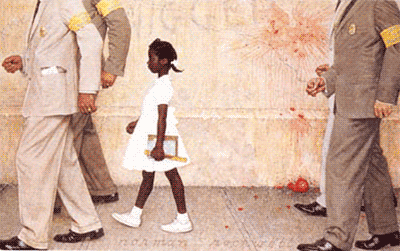When Delpit wrote the article 'Skills and Other Dilemmas' her charge was "not to determine the best instructional methodology" as good teachers utilize a range of strategies. Rather she argued that the debate over instructional approaches "can lead to an understanding of the alienation and miscommunication, and thereby to an understanding of the 'silenced dialogue'" often experienced by teachers of color. The 'culture of power' is relevant to the schism between liberal educational movements and that of non-white, non-middle class teachers and communities.
That "culture of power" includes five aspects, the first three being as Delpit explains, tenets in the literature surrounding the sociology of education: 1) issues of power are enacted in the classroom; 2) there is a 'culture of power', that is the codes for participating in power; and 3) rules of the culture of power are a reflection of the rules of the culture of those who have the power.
The third and fourth I found to be especially enlightening. Delpit's fourth is, "If you are not already a participant in the culture of power, being told explicitly the rules of that culture makes acquiring power easier". She gave an example about going to an unfamiliar culture and preparing oneself by learning their codes about appropriate dress and communication styles. She contends that "it is much he same for anyone seeking to learn the rules of the culture of power." She is right! Teachers need to be the travel tour guide or the Peace Corps staffer whose job it is to prep adventurers before they enter a new land and culture that is strange to them.
Next, Delpit's fifth aspect of the 'culture of power' is that "those with power are frequently least aware of - or least willing to acknowledge - its existence. Those with less power are often most aware of its existence." Although many whites do not perceive themselves as having power, considering that most of us 'struggle up' we at least need to be aware of what others may perceive.
By acknowledging such power we then can explicitly communicate this with learners and support them in breaking the codes. We can have real conversations and truthful dialogues that based on my experiences, are so appreciated by adult and late-teen learners. This lack of acknowledgement or unwillingness perhaps, is a weak attempt to lessen the power differential and used to help to assuage white guilt. Unfortunately the outcomes of such implicit and coded teaching hurts learners. After all learners are not in class to help white middle class teachers deal with issues of guilt which may be the only false/semi-positive outcome of such indirect instruction, and even that is questionable!
Wednesday, June 2, 2010
Subscribe to:
Post Comments (Atom)

Great points here!! I want to talk about all of this in class too!
ReplyDelete